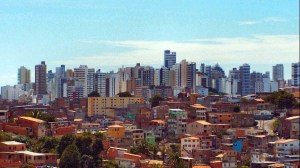
Although many developing countries are currently in the early stages of their urban transitions, Brazil has largely completed its urban transitional process. In fact, Brazil urbanized rather quickly in comparison to countries in places such as Asia and Africa. However, this accomplishment has been exhausting and disruptive in many ways leaving Brazil with severe economic, social and environmental problems.
Failure on the part of policymakers to foresee and plan for intensive urban growth and massive population growth has damaged its urbanization process in a variety of ways. Through their inability to grasp the social composition of the urban growth process and with the persistence of policies aimed at promoting class interests, the spread of severe shelter poverty, fiscal inadequacy and environmental degradation has handicapped Brazil’s ability to take advantage of its full potential.
It is well-know that the concept of urban transition coincides with demographic transition theory. The original theory is by Skeldon, and it suggests that as countries move from rural-agricultural to urban-industrial and from high levels of mortality and fertility to lower levels, they achieve economic success. Thus today, the majority of Brazilian citizens live in urban areas and large cities, levels of mortality and fertility have dropped dramatically, and its urban growth rate has slowed from its previous rate. All these considerations are indications that its urbanization process has peaked and that Brazil is in the later stages of this process.

Although in the later stages of its urban transition, cities still face significant urban growth particularly in the outlining areas. These areas are known as “suburbana” or peripheries of large metropolitan cities. Since the 1950s, these areas have experienced rapid growth due to migrations from the interior regions rather than from natural increase due to births. The majority of the residents in these areas are poor or low-income, living in single-family houses or apartment buildings. For the most part, governmental programs to relocate inhabitants have failed because inhabitants resist moving from areas that are in close proximity to their places of work.
Nevertheless, Brazil’s urban transitional process and its significance for present-day social and environmental analysis is a substantially important factor. What is most striking about its urbanization process is the rapid and advanced development that it has undergone. For example, a process that took centuries for North America and Europe to accomplish, – that is, to shift from being 10 per cent urban to 52 per cent urban between 1750 to 1950, by the time the first comprehensive demographic census was taken in 1940, Brazil moved from 31 per cent urban to 81.1 per cent urban in just 60 years. Thus, Brazil’s substantial urban growth process is unique and one of the underlining factors contributing to its present-day rapid economic growth.
Sources: Martine, G. and George McGranahan (2010). Brazil’s early urban transition: what can it teach urbanizing countries? London; New York: Brazilian Association of Population Studies and the International Institute for Environment and Development; Skeldon, R. (1990). Population Mobility in Developing Countries. London and New York: Belhaven Press.
For more information see: Neil Turner – Brazil: Settlement, immigration and urbanization; Ethnology/Cultural Anthropology; Grin Publishing http://www.grin.com
Have you ever thought about adding a little bit more than just your articles? I mean, what you say is valuable and everything. However imagine if you added some great pictures or video clips to give your posts more, “pop”! Your content is excellent but with pics and videos, this blog could certainly be one of the most beneficial in its field. Great blog!
LikeLike
We save that for our affiliate site – Ethno Filmmakers. Thank you for taking time to read the article.
LikeLike
We stumbled over here different page and thought I should check things out. I like what I see so now i’m following you. Look forward to looking over your web page repeatedly.
LikeLike
Thank you for taking time to read the article.
LikeLike
I and also my guys ended up looking at the good tips located on your web page and immediately came up with an awful feeling I had not thanked the website owner for those techniques. Those men happened to be as a consequence happy to see all of them and have now simply been taking pleasure in them. I appreciate you for turning out to be so accommodating and also for making a decision on this form of good themes millions of individuals are really needing to know about. Our sincere apologies for not expressing appreciation to earlier.
LikeLike
Please forgive me for taking so long to respond to your comments. But, as you can imagine, I have been busy writing. Personally, I want to say that comments like yours are what gives true value – that is, really true value to my work and more than that – it moves my heart. Thank you and continue to read. As I promise to continue to present the best that I can produce…tchau…Neil Turner.
LikeLike
I’d have to examine with you here. Which is not one thing I usually do! I take pleasure in reading a post that may make folks think. Additionally, thanks for permitting me to comment!
LikeLike
Your welcome and thank you for taking time to read the article.
LikeLike
Good day! This post could not be written any better! Reading this post reminds me of my previous room mate! He always kept chatting about this. I will forward this write-up to him. Fairly certain he will have a good read. Thanks for sharing!
LikeLike